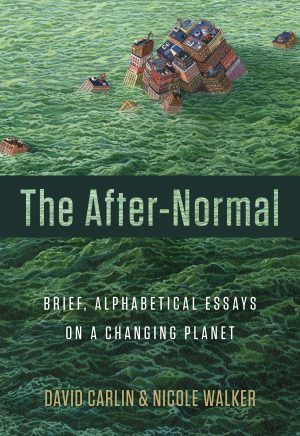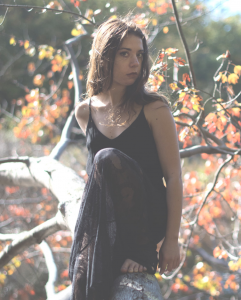
by AnnaLee Barclay
One of my favorite things to do is have long, winding conversations with a good friend, conversations that explore themselves as time passes by and ideas are spoken aloud. It could start with discussing a particular book and end with marveling at crow intelligence. There are no objectives, no arguments to be made, no point to reach. Conversations that feels like a slow Sunday morning, even if some of the material is heavy or alarming. Reading The After-Normal by David Carlin & Nicole Walker (Rose Metal Press, 2019) feels like sitting in on one of these conversations as a silent observer, and what a joy it is.
Written in the form of brief essays that alternate between Carlin and Walker, the authors follow the alphabet for each essay’s prompt. Starting with Albatross, they work their way to the end, to just ‘Z,’ forming a collection that presents a startling but engaging, humorous, and sentimental look at anthropogenic climate change and its effects on all life. By using the precedent of an established and known alphabet, there is a certain norm, an expectation of what is to come, as it’s a system we’re familiar with. A, then B, then C, so on. This precedent is then subverted throughout the collection, as sometimes the authors misspell words (Walker’s essay “Xtinction,” instead of “Extinction,” fittingly places the end of a “normal” environment and its creatures at the end of the book) or do more than one essay each for a letter.
It could be said that the use of the alphabet of a framing device represents our naïve conception of a “normal” world—one in which the climate is as it’s always been in our memory and that the animals we have loved since childhood aren’t starving on the brink of extinction. This is, of course, a narrow and inaccurate placement of nature, climate systems, health, economics, biology, and everything in their own unchanging vacuums. One of the tragedies of this sort of thinking is that in not recognizing the connectivity between all facets of life and existence, we collectively sever our connection to the others at the ultimate detriment of ourselves and our home, this planet. There are those who have always known this but we are only just now seeing large populations of ordinary people waking up to this nightmare, albeit too late for “normal” to continue. David Carlin nails this sad reality in his extremely short essay, “Death,” when he asks: “So soon? But we were only getting started.”
But what do we do then—how do we reconcile knowing and accepting the gravity of this situation and still continue to live day-to-day? It isn’t enough to sit and speculate, or complain, or have a constant panic attack until your body shuts down. There are chores to be done, jobs to be worked, bodies to be fed and cleaned and taken care of, time to be enjoyed for sanity’s sake. Carlin & Walker, to the benefit of us all, recognize this and use these micro-essays to tackle this seemingly contradictory existence. In one of my favorite essays, “Individual,” Walker writes about eating sardines for health and brainpower, something that will benefit her life in a multitude of ways. But she’s aware of the multitude of ways eating sardines harms marine life, such as pollution from transporting seafood to Walker’s landlocked Arizona, bycatch in large fishing nets, and taking the actual sustenance that other animals rely on (which, let’s face it, we don’t rely on sardines, even if they’re good for us). The beauty of this essay is the raw honesty in recognizing the contradictions and hypocrisy within those who are very aware of the current and impending ecological crises.
This book is a necessary addition to the dialogue surrounding environmentalism and the future of humanity as we move forward into the After-Normal, as Carlin and Walker have coined our dangerous and uncertain future. Throughout the collection, they return to the idea set forth by feminist scholar Donna Haraway, which is to “stay with the trouble.” That is, they want to explore the problems we’re facing with honesty, but also humor and compassion for the human condition.
I’ve never read anything quite like this book, as anything collaborative can sometimes be messy or inconsistent. Rather, these essays feel like a collection of letters between close friends who understand each other’s brains and souls. While the alternating perspectives generally don’t follow each other linearly, at times the authors address each other with the second person “you.” But what happens is that the reader feels addressed and is suddenly confronted with their role in this situation: How am I culpable? How aware am I as to what is happening, and how am I going to embrace the changes I need to make to contribute to a more tolerable future for me and others, including non-human life? How can I still laugh and fall in love and carve out a piece of land for myself? There are no simple answers, but as David points out in his essay “World.” “One thing leads to another once you start asking questions.” Sometimes, asking the question is more eye-opening than finding any right answer.
__________________________________
 AnnaLee Barclay is a photographer and writer from Long Island. She was recently a member of The Lie Factory, a 12-week long fiction workshop taught by Lidia Yuknavitch and Chuck Palahniuk in Portland, OR. She has read for The Southampton Review and her work has appeared in SmokeLong Quarterly, Atticus Review, and Pretty Owl Poetry. You can find her on Instagram and Twitter @annaleebarclay.
AnnaLee Barclay is a photographer and writer from Long Island. She was recently a member of The Lie Factory, a 12-week long fiction workshop taught by Lidia Yuknavitch and Chuck Palahniuk in Portland, OR. She has read for The Southampton Review and her work has appeared in SmokeLong Quarterly, Atticus Review, and Pretty Owl Poetry. You can find her on Instagram and Twitter @annaleebarclay.

 The core workshop of SmokeLong Fitness is all in writing, so you can take part from anywhere at anytime. We are excited about creating a supportive, consistent and structured environment for flash writers to work on their craft in a community. We are thrilled and proud to say that our workshop participants have won, placed, or been listed in every major flash competition. Community works.
The core workshop of SmokeLong Fitness is all in writing, so you can take part from anywhere at anytime. We are excited about creating a supportive, consistent and structured environment for flash writers to work on their craft in a community. We are thrilled and proud to say that our workshop participants have won, placed, or been listed in every major flash competition. Community works.